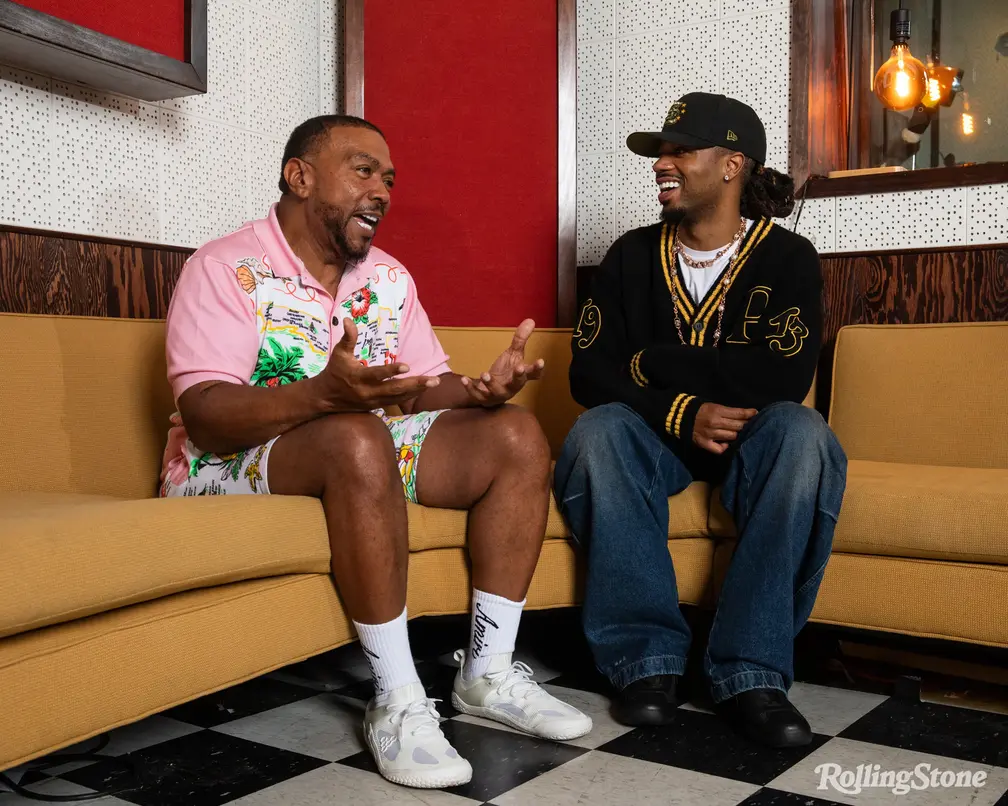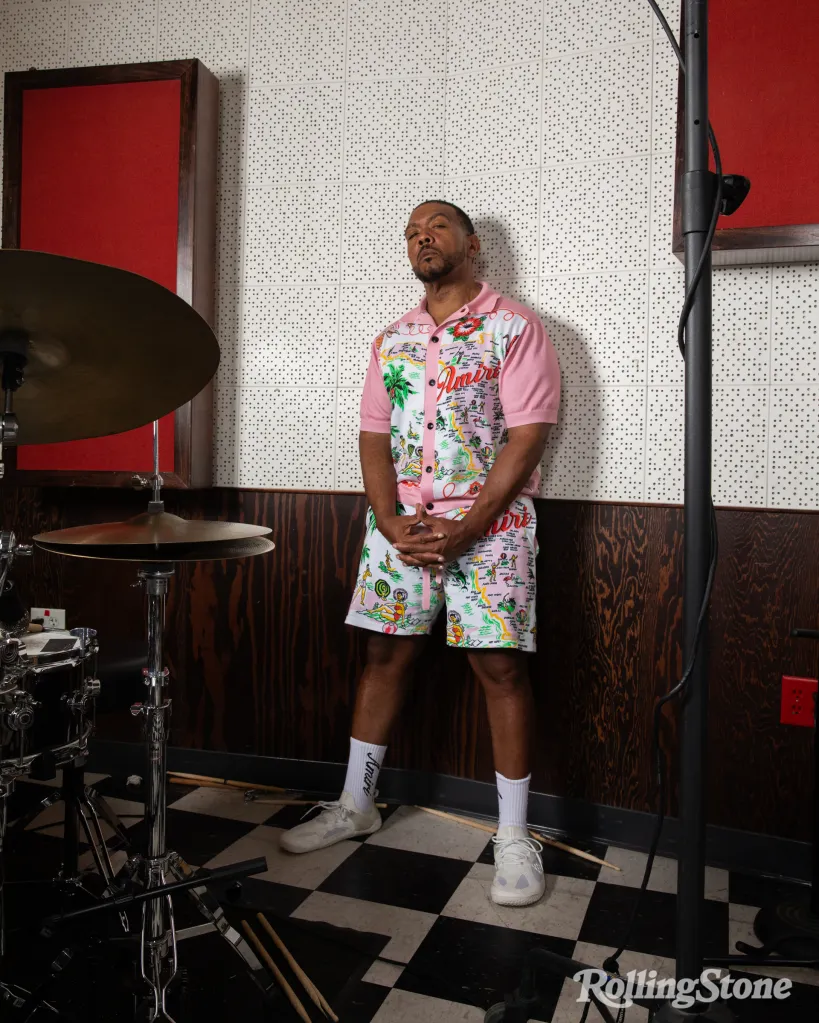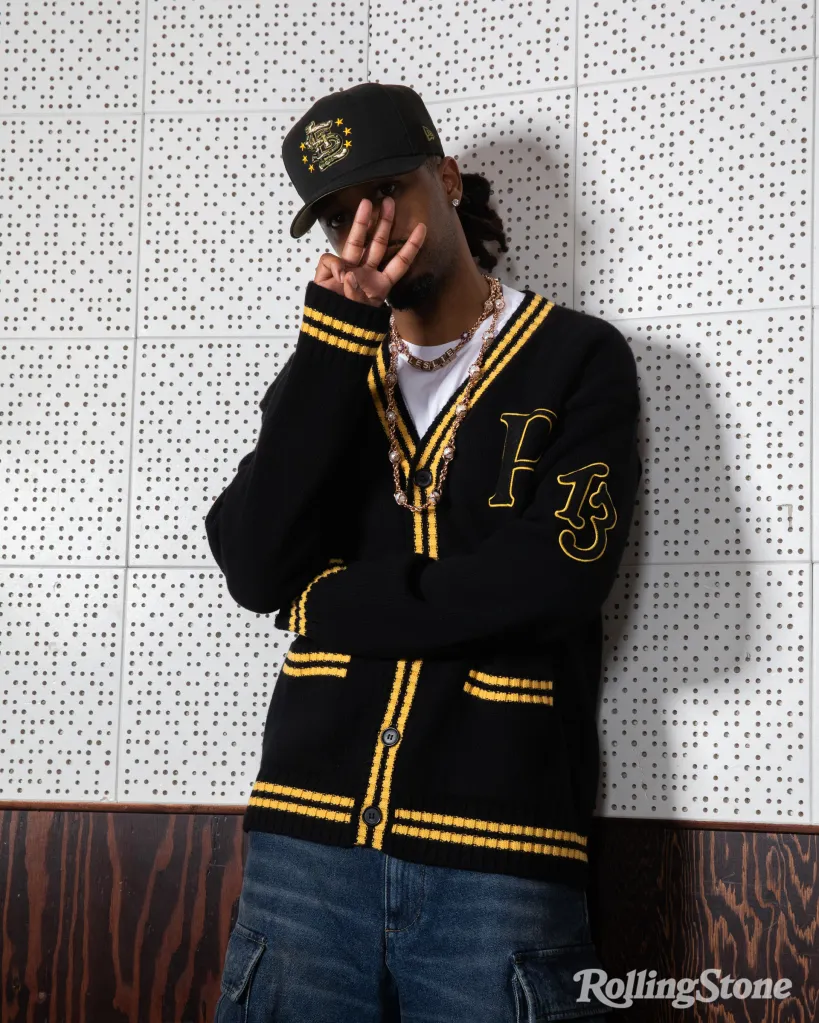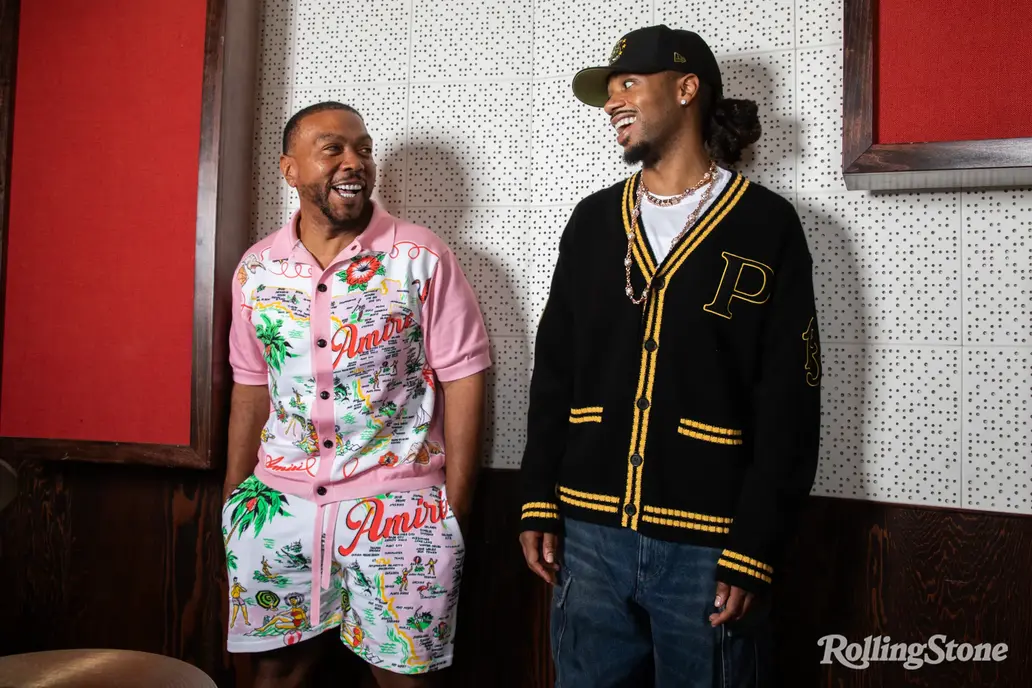They’ve defined the sound of their eras, while producing hit after hit. Now, they’re sitting down to compare notes on everything from the editing process to which big-name rappers are really picky about their beats.
Timbaland and Metro Boomin are sitting in 11th Street Records in Las Vegas one afternoon in July, talking about the difference between a hit and a classic. “You did ‘Bad and Boujee’, ” Timbaland notes, referring to the 2016 Migos track Metro produced. “That’s a classic.” Metro offers his own distinction. “There might be a classic that peaks at Number 23, and another song goes Number One,” he notes, “but you can play them both 10 years later, and you might not even want to hear the One.” (For the record, “Bad and Boujee” was a classic and a Number One.)
The producers are more than qualified to speak on this subject — both have more than their share of both hits and classics. Timbaland, 52, became one of the defining beatmakers for the Nineties and 2000s by pushing acts like Missy Elliott, Aaliyah, Ginuwine, and Justin Timberlake into spaces that were at once undeniable pop and verging on the avant-garde. His work with Jay-Z includes many of the legendary rapper’s best-remembered songs, and while he’s mastered wildly disparate sound palettes, Timbaland’s intricate percussion work and industrial melodies make his beats instantly recognizable. Metro, 31, has followed in this auteurist lineage, his heavy bass and relentless bounce buoying work by rappers including Young Thug, Future, Migos, 21 Savage, and many others. Both are having big years — Timbaland has played a key role in albums by longtime collaborators Kanye West and Timberlake. Meanwhile, Metro has scored not one, but two Number One albums in 2024, with his Future collaborations We Don’t Trust You and We Still Don’t Trust You.
Timbaland is passing through Vegas in the midst of a tour-heavy year, while Metro is in town for a DJ set the night before, where he pulled from his catalogue as well as Timbaland’s. The pair have an easy chemistry; they can speak credibly about asserting their personality, even when behind the scenes.
Timbaland: Every producer has that one record that makes you go back and listen to the ones before. And I believe that “Superhero” record was the one that made me go back and listen from the beginning. I was like, “Wow, he understands sonics. A lot of people clutter music. He only uses four or five sounds, but they felt like 30 sounds.” To me, that’s what makes a great producer. When you’re coming from the hood — my mom didn’t have money to go buy me equipment, so I used to beat on the lunchroom tables and use double cassette decks and dub ahead so I could record over them. If you can do shit with just four elements, that’s a masterpiece. Simplicity is easy to say but hard to do. If you listen to Metro’s hits, there’s a tone in there. That’s all you need.
Metro Boomin: What’s necessary, what’s most necessary.
Timbaland: You can add little trinkets, but why? It’s a hit. To me, knowing when something is done is what makes you a classic producer. A lot of people overproduce: I call it producer porn. When you know how to stop, that’s a beautiful thing.
Love Music?
Get your daily dose of everything happening in Australian/New Zealand music and globally.
Metro Boomin: That means a lot to me, man. I appreciate that.
Timbaland: What did you come up on?
Metro Boomin: In seventh grade, my mom had got me this laptop for Christmas. It was a PC, one of those HPs or something. I got a cracked version of Fruity Loops [now FL Studio] and just started trying stuff on there. I didn’t really know how to use it, or how to XYZ, but just trial and error all night, every day.
Timbaland: What drew you to music?

THE STUDIO: 11th Street Records, Las Vegas
An independent record store in downtown Vegas, not far from the Strip, 11th Street Records is home to self-described “evangelists for vinyl” — and includes a recording studio in the back.
HIT LIST: The Killers, ‘Wonderful Wonderful‘; Jean Dawson and SZA, “NO SZNS”; Anti-Flag, ‘Live Acoustic at 11th Street Records‘; SECOS, ‘Loveseat’
Metro Boomin: When I was younger, I wanted to rap. I’m from St. Louis, so growing up seeing Nelly, Murphy Lee, [the St. Lunatics], I was just like, “Man, this is what I want to do.” But I didn’t know how to tell [my] mom or grandma that I wanted to grow up and be a rapper. Back then, people mostly had real jobs — not like today. “Music producer” sounded like some halfway-business type shit. I really just got Fruity Loops to make my own beats to rap on. But I fell in love with that side of it. I figured that being a rapper was already such a saturated thing — this was 2007, 2008; it’s crazy to say that now — but it already felt that way then. I figured it would be easier to get my foot in the door as a producer.
Timbaland: You did “Bad and Boujee”. That’s a classic. You know that right? There’s a difference between hits and classics.
Metro Boomin: There might be a classic that peaks at Number 23, and another song goes Number One, but you can play them both 10 years later, and you might not even want to hear the One.
Timbaland: And “Bad and Boujee” is a classic. Play it today.
Metro Boomin: I played it out here last night [laughs].
Timbaland: I ask people: How many songs will play five, 10 years from now? I go through your catalogue and go, “How many classics do you have?” You’ve got a lot of hits. But that’s your first stage of hunger, you’re just in it. It’s like when I did “Work It”.
Metro Boomin: I played that last night too [laughs]. And they went crazy as soon as the beat dropped.
Timbaland: I knew that right away. When I go to the studio with Missy, she always beats me up.
Metro Boomin: I read about that — about you trying to play her beats.
Timbaland: She really took me through the ringer. You know how it be as a creator, when you do something, you come in [the studio] you be hype, then they shut you down?

Metro Boomin: You be thinking, “I got it!” Then they shit on it [laughs].
Timbaland: Back then, I never saved. So I had to click my keyboard and cut it back on and restart again!
Metro Boomin: Ah, no, bro!
Timbaland: You understand? Every time! Or erase the whole sequence and go, “Man, I don’t know.” Then Missy would cuss me out: “Where are my beats? You just killed 10 of them!” When I did “Work It”, it was me pushing her. She heard the beat. I said, “There’s nothing you can say about this.” She never let me watch her record. I could go to the club and come back. So I came back, and I was like, “That ain’t it.” She came back again, and I said, “It ain’t there.” The third time, she said: “If this ain’t it, I quit. We just gotta do something else. But I know this is it.” When she pushed play, and that backward sound played, I said, “Stop.” She looked nervous. I said, “We number one forever. This is insane!” That’s the push. She pushed me — that’s how all them beats came about. When I go back and listen to [beats she rejected], I be like, “OK, I can see her point.” They weren’t simple enough.
Metro Boomin: That’s one of the hardest beats of all time to me. I remember my mom having the CD. It used to always be in the side of the car door, and she would play that song every day, bro.
Timbaland: It only had three sounds.
Metro Boomin: But that’s all you need a lot of the time. You gotta give the artist room. We gotta play the background.
Timbaland: She taught me that. I would’ve never known that. Pharrell [Williams] was like that too — he’d use simple sounds.
Metro Boomin: For sure. About two, three of them, that’s it. Maybe these strings come in on the bridge one time. I know y’all used to have your battles.
Timbaland: Our studios were right beside each other. I’m working on Missy; he’s working on Kelis. I walked in, and I heard [sings the hook of Kelis’ “Caught Out There”]. I walked back to Missy and said, “We gotta rethink our whole shit.” I had to go sit in the lounge. Who does a hook like that? He’s a genius. We didn’t allow no bullshit to come out.
Metro Boomin: Steel sharpens steel, yeah.
Timbaland: I just like to see how another person thinks, how weird another person can get. New York was New York; coming up from Virginia, it was like, “Y’all can’t get in.” So I was pushed. Missy pushed me. Pharrell pushed me. The Clipse.
Metro Boomin: There’s something in the water.
Timbaland: I remember when Pharrell had his run — I was doing all the Jay-Z records. I got to New York, I was chilling, and then I was driving and heard [hums the opening of “I Just Wanna Love U”]. I pulled over and said, “I think I might have to go into retirement for a couple years.” Then I go back home to Virginia, and he had [“Shake Ya Ass”] shaking the whole club. I said, “Pack it up, we gotta rethink our whole shit.”
Metro Boomin: The way he took that James Brown shit and put it on some rap shit.
Timbaland: That boy was too hot. I asked him, “You putting anything out anymore?” Then I could come sneak in the door.
Metro Boomin: Both y’all have them bounces, bro. And it’s not even just the bounce with the drums — that’s what I be trying to stress to people — it’s the rhythm and the bounce with the sounds you’re using, too.
Timbaland: It can come together like a puzzle.
Metro Boomin: Everything’s in its own pocket and slot.
Timbaland: Pharrell’s great at that. He can hear an old record and mimic it his way. We loved the Jungle Brothers. He did that [raps the opening bars of Jay-Z’s “La-La-La (Excuse Me Miss Again)”], which is from an old Jungle Brothers song. I was like, “How did he do that?” He took something we used to jam to and remade it better. We had a lot of fun making music together. It was friendly competition. I always liked that about our community.

Metro Boomin: “Now, I’m charged up. Now, I’m going to the studio.” That feeling. The artist community’s different. As a producer, I’m here to service you, help you execute your vision to the best we can. If you got ideas of where you wanna go, we can try all that first. I have no ego about it. But we gon’ still at least attempt to get a couple of these other ideas off that I have and you might be with, or you might not be too excited about at first — you might not fully see how I’m seeing it. But we’re gonna get in there and try everything.
After so many years, I feel that with a lot of trial and error and so many times it has worked, I think there’s a level of trust developed. If I go to one of my frequent collaborators and go, “Let’s try this,” and it’s way outside of what they’ve done, it’s not as much of a fight, because I’ve told them crazy shit before and it’s worked.
Timbaland: I’m the same way. The artists trust us after a while. I remember when I did “Big Pimpin”, it was actually for me and Magoo. I knew in my spirit I’m not even trying to do this beat. So as Jay was walking out [of the studio], I said, “I’ve got something I wanna play for you. Actually, I don’t wanna play it for you, but my business mind says I should play it for you” [laughs]. He had on his jacket; he was right at the door. He heard the beat, took the jacket off. I said, “Hold on, man. You’re not gonna be able to finish this song tonight. This beat gon’ beat your ass.” He was like, “It’s me, nigga. I’m Hov!” He called me early the next morning: “Come to the studio.”
Metro Boomin: I couldn’t imagine hearing that for the first time.
Timbaland: He was like, “I told you, nigga, I’m the best!” It got to the point where I didn’t want to work with no other rapper besides him. This man don’t write nothing down. That Purple Reign album [the 2016 Future mixtape Metro executive-produced]… classic.
Metro Boomin: That’s one of my favourites.
Timbaland: That’s a classic album. I’ll tell you another classic song: [Raps the hook to “Mask Off”]. That will play 10 years from now. You can play that now — it’ll go crazy.
Metro Boomin: I played that last night too [laughs].
Timbaland: But [Purple Reign], that’s when I was like, “OK, this boy’s nasty.” I was like, “Wait a minute. I knew I had my own bounce, but that bounce threw me off.” You got the championship ring with that album. And all the stuff you did with Young Thug.
Metro Boomin: I appreciate that. He’s the reason I learned Pro Tools, learned how to record people. The studio we were using early on, for free; when we weren’t able to use it anymore, and we had this flow going, it was like, “Damn, what are we gonna do now?” I had this townhouse, and I went and got Pro Tools, a home Mac, a mic, a couple pairs of headphones, and just figured it out at the house. I started just trying stuff. Not too long after that, I started working with Travis [Scott], and I would watch him do background vocals, then go try some of that stuff on Thug’s music. It was a whole new world to me. Before that, I was still producing: I would make beats, work with artists, go back and forth with ideas, give a hook idea, but now, I was upping my technical game. Then I fell in love with that whole editing process, which is one of the main parts of my game today.
Timbaland: You edit and all that? That’s what you love to do?
Metro Boomin: I love making beats. But once I have everything in the same session, I feel like I can paint and sculpt. I have everything vocally, everything production-wise, and it’s like, “How are we gonna shape this from start to finish?”
Timbaland: Do you mix your records?
Metro Boomin: Yeah, me and my engineer, Ethan, that’s my partner, we mix everything together.
Timbaland: How often do you make the artist redo their vocals?

Metro Boomin: As I get older, more and more. Me and [21] Savage get into that sometimes. It’s the same thing you said with you and Missy: He’s the pickiest artist I’ve ever worked with, with the beats. I’ll play this man 35 or 40 beats before he wants to get in the booth. And it can be draining: He’ll go, “Next one, next one, next one, next one.” But in return, I’m like, “OK, you’ve gotta overly bring it on this one. I’m not taking any OK shit, nigga.”
Timbaland: I think y’all make some incredible music together.
Metro Boomin: He’s definitely my favourite to work with. We’ll get on each other’s nerves, go back and forth all the time. But at the end of the day, we make each other better. If I play him 20 beats and he’s not really feeling them, I’m going home and cooking up. You need that.
Timbaland: I feel like you’ve got your top three or so acts you can work with, but you also got some shit with James Blake, too.
Metro Boomin: We got a whole album in the can.
Timbaland: I feel like you and him is me and Justin Timberlake. Y’all ain’t make that moment yet, but y’all can. I ain’t saying you gotta do “Cry Me a River”, but what’s Metro and James Blake’s “Cry Me a River”? Once you crack that code, then you get into the, you know with Pharrell, Despicable Me, all that. You did it with the Spider-Man [Across the Spider-Verse soundtrack, which Metro curated]. But when y’all make that magic, trust me, bro. You gotta do it. Y’all gon’ sell 10 million records.
From all my experiences of doing this shit, learning from Jay, learning from Jimmy [Iovine], all those trials and errors, I just try to give all the stuff back to someone who’s gonna surpass me. I was watching Cars 3, me and my daughter, and the moral of the story is you’ve gotta accept when it’s time to pass the torch, when it’s time to play the background. When Quincy did Thriller, he was still Quincy Jones, but he knew what drummer to get, who to write, this person, that person, and Michael Jackson will be the biggest. He didn’t have to write everything; he knew who to get. I’m at the stage of my life where I’m Lightning McQueen. What else can I create? What else can I build? I tell all the OGs, “There’s nothing wrong with being a teacher.”
Metro Boomin: You helping them is a part of your legacy as well. It’s like a tree. I appreciate you, bro. You’ve always been there, to listen or to lend any advice. When you was at Conway [Studios] and you and JT would come through and listen to my album and give y’all thoughts, all that kind of stuff is surreal to me and means the world. When y’all sent me the MPC Live for my birthday, that changed my life, because I was so invested in the old MPCs. And I still love them. But having that opened me up to the new ones. I’m just grateful.
Timbaland: I’ma give you everything. You’re the future.
PRODUCTION CREDITS
Executive Producer: KIMBERLY ALEAH. Co-Executive Producer: TARA REID. Metro Boomin: Styling by FATIMA B. Producer: VANESSA WILKINS. Director of Photography: Rayshun McCormick. Camera Operators: DAVIN GUMABON and CALEB SAN NICOLAS. Sound Mixer: OSCAR REYNAGA. Editor: ARIEL JULIA HAIRSTON. Color Grading: AYUMI ASHLEY. Photographic Assistance: ZONEIL MAHARAJ and QUINDO MILLER.
The December 2024-February 2025 issue of Rolling Stone AU/NZ is on newsstands now.
Whether you’re a fan of music, you’re a supporter of the local music scene, or you enjoy the thrill of print and longform journalism, then Rolling Stone AU/NZ is exactly what you need. Click the link below for more information regarding a magazine subscription.
Visit the Rolling Stone Musicians on Musicians microsite here.

































